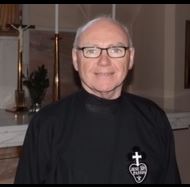I’m writing my log this week on the Feast of St. Willibrord (658-739 AD). Willibrord was a missionary from Northumbria, known as the Apostle to the Frisians, in what today would be the Netherlands. He later became the first Bishop of Utrecht. My interest in Willibrord goes back to when I was living in the Passionist Monastery at Minsteracres in Northumberland, which I imagine corresponds to part of Northumbria back in the day. At that time, I was the novice master for the Passionists of North Europe and on visits to our Dutch Province, the Province of Mary, Mother of Holy Hope, I would always meet people who spoke with great love and affection for Willibrord who brought the faith to them back in the 7th/8th century.
Willibrord became the first bishop of Utrecht and that sparked off an extraordinary memory from a time I was visiting the Dutch Passionists in their mother house at a place called Haastrecht, about 25 miles from Utrecht, which is a really beautiful city. While I was there the community hosted a meal, and among the guests was an Irish girl who played the viola in an orchestra based in Utrecht. She was placed beside me so that we could chat away in English as my Dutch was non-existent. Almost immediately she asked me if I knew an Irish Passionist called Father Herman, which of course I did, God rest him.
Father Herman was a lovely, but rather eccentric man, a poet and a musician, who was very much involved in the Legion of Mary. He had been a great friend and confidante of Frank Duff, the founder of the Legion of Mary, and he inherited Frank Duff’s bicycle when he died, keeping it suspended from the ceiling of his small cell in Mount Argus monastery. Herman himself loved to go cycling, especially to Glendalough, site of the monastic settlement in County Wicklow founded by St. Kevin in the 6th century. Sometimes he would go there and forget that he was due back to celebrate the evening Mass. When I was rector and parish priest at Mount Argus, he could at times frustrate and infuriate me because of his unpredictability, but I could never stay angry with him because I liked him so much, and he was always willing to help out if I was under pressure – so long as he remembered.
Glendalough was the location for this story told to me by the Irish viola player. She was off somewhere with the orchestra when her father died and, for whatever reason, the family were unable to get in contact with her. Funerals happen quickly in Ireland and so, by the time she found out, he father was already buried. She went home, and one day she was walking in Glendalough, where her father had often walked. She was thinking about him and feeling sad when she came across Father Herman pushing his bicycle up a steep hill. She had never met Father Herman before, but they got talking and she told him about her father and about missing the funeral. Herman asked her if her father was also a musician, which he was. Father Herman then told her that he had known her father, and had once written a poem about him, which he happened to have in his jacket pocket at the time. He then reached into his pocket, produced the poem, and gave it to her to keep. She was overwhelmed, shed floods of tears, and shed them anew as she told the story to me, and never forgot Herman ever after. As I always say, there is no such thing as coincidence in the life of faith, only providence.
Collect for the Feast of St. Willibrord:
O Lord our God, you call whom you will and send them where you choose: We thank you for sending your servant Willibrord to be an apostle to the Low Countries, to turn them from the worship of idols to serve you, the living God; and we entreat you to preserve us from the temptation to exchange the perfect freedom of your service for servitude to false gods and to idols of our own devising; through Jesus Christ our Lord, who lives and reigns with you and the Holy Spirit, one God, for ever and ever. Amen.

 RSS Feed
RSS Feed
